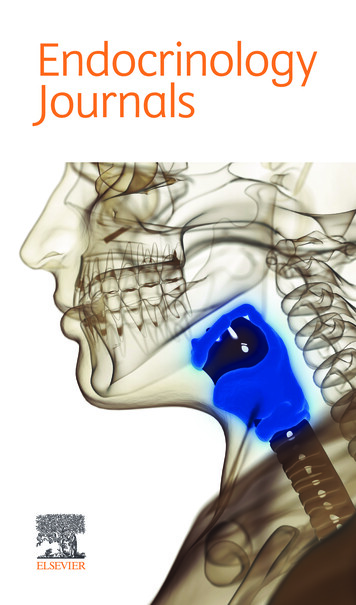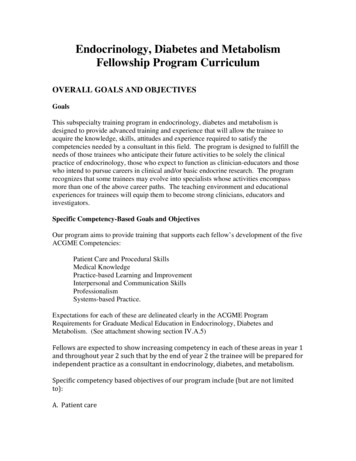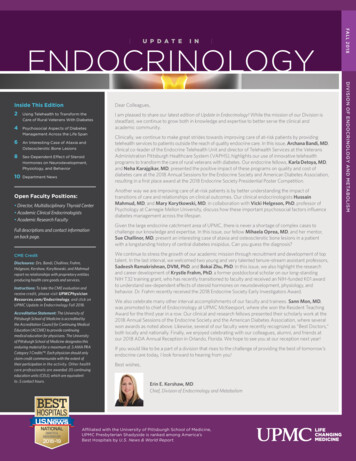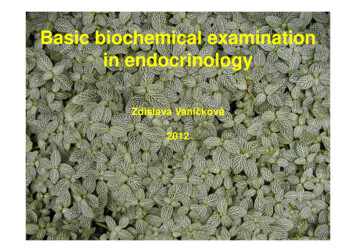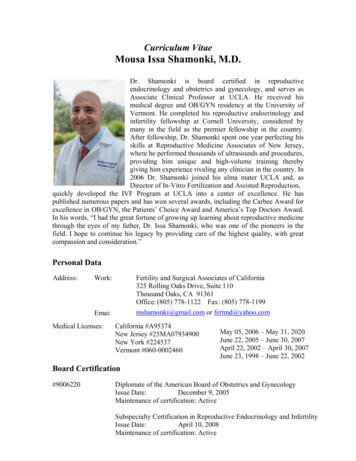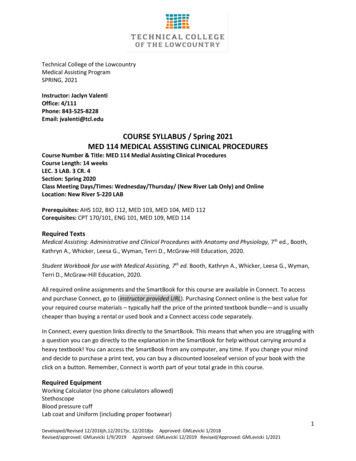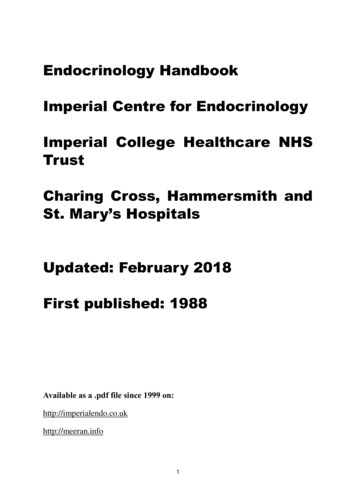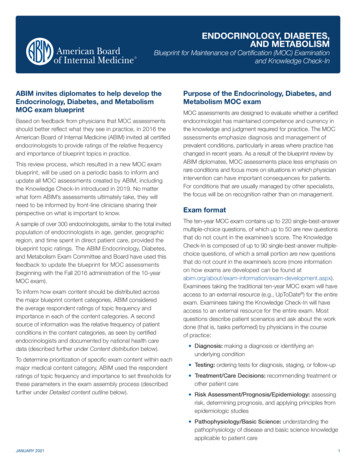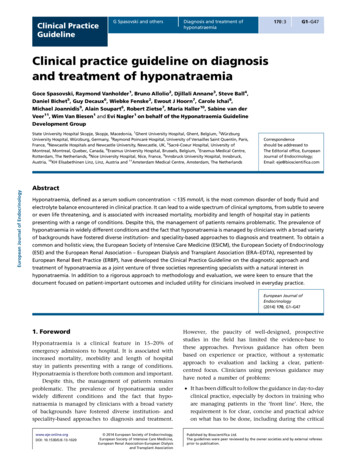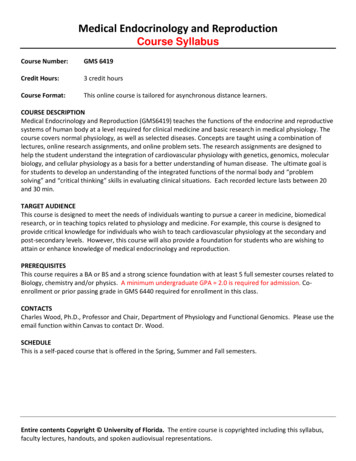
Transcription
Medical Endocrinology and ReproductionCourse SyllabusCourse Number:GMS 6419Credit Hours:3 credit hoursCourse Format:This online course is tailored for asynchronous distance learners.COURSE DESCRIPTIONMedical Endocrinology and Reproduction (GMS6419) teaches the functions of the endocrine and reproductivesystems of human body at a level required for clinical medicine and basic research in medical physiology. Thecourse covers normal physiology, as well as selected diseases. Concepts are taught using a combination oflectures, online research assignments, and online problem sets. The research assignments are designed tohelp the student understand the integration of cardiovascular physiology with genetics, genomics, molecularbiology, and cellular physiology as a basis for a better understanding of human disease. The ultimate goal isfor students to develop an understanding of the integrated functions of the normal body and “problemsolving” and “critical thinking” skills in evaluating clinical situations. Each recorded lecture lasts between 20and 30 min.TARGET AUDIENCEThis course is designed to meet the needs of individuals wanting to pursue a career in medicine, biomedicalresearch, or in teaching topics related to physiology and medicine. For example, this course is designed toprovide critical knowledge for individuals who wish to teach cardiovascular physiology at the secondary andpost-secondary levels. However, this course will also provide a foundation for students who are wishing toattain or enhance knowledge of medical endocrinology and reproduction.PREREQUISITESThis course requires a BA or BS and a strong science foundation with at least 5 full semester courses related toBiology, chemistry and/or physics. A minimum undergraduate GPA 2.0 is required for admission. Coenrollment or prior passing grade in GMS 6440 required for enrollment in this class.CONTACTSCharles Wood, Ph.D., Professor and Chair, Department of Physiology and Functional Genomics. Please use theemail function within Canvas to contact Dr. Wood.SCHEDULEThis is a self-paced course that is offered in the Spring, Summer and Fall semesters.Entire contents Copyright University of Florida. The entire course is copyrighted including this syllabus,faculty lectures, handouts, and spoken audiovisual representations.
COURSE GOALSPhysiology is the science of how the body functions, and is the basis for understanding modern clinicalmedicine and the biomedical sciences. This course will provide: 1) a foundation understanding of the basicfunctions of the endocrine system; 2) integration of individual facts in order to understand how organ systemswork independently and interdependently in the body. One example of this integration is in the understandingof normal reproduction. Other examples covered in this course include understanding developmentalanomalies in the endocrine system.LEARNING OUTCOMESUpon completion of this course, students will be able to:1. Understand the function of hormones, including the different endocrine axes and the processes thatthey control.2. Understand the hormonal control of reproduction.3. Understand how hormonal systems act in an integrated manner to regulate overall body functions.4. Understand how failure of these normal physiologic functions and integrations are associated withsome diseases.5. Demonstrate the ability to apply physiological principles of clinical and basic science relevancy bymultiple choice examinations, research assignments, and quiz exercises.LEARNING RESOURCES1. Recorded video lectures with PowerPoint presentations will be provided on the course website.2. Recorded video clinical correlation(s) and/or case studies relating to the basic science material.3. Lecture notes for each video lecture are available as PDF downloads enabled for direct note taking.4. Required text: Student may wish to supplement the course videos and PDF handout by purchasing an online version of1."Berne & Levy Physiology, 7th Edition" 2018. Author: Bruce M. Koeppen & Bruce A. Stanton. ISBN: 9780323393942. and2."Ganong's Review of Medical Physiology, 25th Edition" 2015. Author: Barrett et al. ISBN: 9780071825108 (free aspx?bookid 1587).COMMUNICATION WITH FACULTYIf you have questions about the material or the course, please contact the course director (Dr. Wood) usingthe email function in Canvas.STRUCTURE OF CONTENTThe course content is structured into sub-topical groups of lectures that are accompanied by Problem Sets.Problem Sets are designed to help the student master the course material. These problem sets completed astake-home assignments, but are graded. There are 3 Functional Genomics Research Assignments, which aredesigned to help the student integrate the concepts of physiology with functional genomics and humandiseases of genetic origin. These Research Assignments are also completed as take-home assignments and arealso graded.COURSE CALENDAR and RECOMMENDED TIME MANAGEMENTThe videos and corresponding PDF notes are available throughout the entire time the course is open, from thefirst day through the end of the course on the day the grades are reported to the Registrar. However, theExam is open ONLY during the window of time shown on the website. The course content lecture titles shouldbe viewed in the order shown later in this syllabus.
EXAMINATION AND GRADINGThere will be one multiple-choice examination covering the material taught in the lectures. The exam will bemonitored by ProctorU, a UF chosen service that allows the students to complete their exams at home whilestill ensuring academic integrity. Students will take the exam at a computer that meets the technicalrequirements of ProctorU, including a web cam and microphone. Students will make the arrangements forexam proctoring. The exam may be taken any time during the window of availability; however, it can only betaken once.We recommend you make an appointment with ProctorU at least two weeks in advance of your preferredexam date. All costs of the exam are covered in the registration costs. Scores are reported as a percent. Thepoints used to compute final grades will be determined after all assignments and the exam have beencompleted.GRADING SCALE:A numerical grade will be given at the end of the course and will be scored as follows, per University of -79%73-76%70-72%67-69%63-66% 63% A A B B B C C C D D EThe final examination accounts for 20% of the total grade, Functional Genomics Research Assignments 30% ofthe total grade, and Problem Sets 50% of the grade.GRADING POLICYThere are no make-up exams unless otherwise granted by the course coordinator prior to an examinationdate. Failure to take an exam without prior permission from the course coordinator will be recorded as 0.
ACADEMIC HONESTYPlease review the complete policy of the University of Florida regarding academic dishonesty, found in theonline student handbook at: l/pdf-files/handbook.pdf .Students are expected to abide by the University of Florida Academic Honesty Guidelines and to adhere tothe following pledge:“We, the members of the University of Florida community, pledge to hold ourselves and ourpeers to the highest standards of honesty and integrity.On all work submitted for credit by students at the University of Florida, the following pledge is eitherrequired or implied:"On my honor, I have neither given nor received unauthorized aid in doing this assignment."IMPORTANT NOTICE ABOUT PLAGIARISMPlagiarism is not tolerated at the University of Florida. Plagiarism may be punishable by expulsion from thecourse or the certificate program. If the plagiarism is detected after the certificate has been awarded, thecertificate may be rescinded.The University of Florida has an honor code that defines plagiarism as follows:Section 3a: Plagiarism.A student shall not represent as the student’s own work all or any portion of the work of another.Plagiarism includes but is not limited to:1. Quoting oral or written materials including but not limited to those found on the internet,whether published or unpublished, without proper attribution.2. Submitting a document or assignment which in whole or in part is identical or substantiallyidentical to a document or assignment not authored by the student.Please note that intent is not an element of this kind of violation so it is important to take great care tocomplete the written assignments in your own words.For a complete description of the UF Honor Code and procedures, please -conduct-honor-code/For a good discussion about plagiarism and how to properly cite your sources, please y/adaa44500eaf460a84f238e6b9a558f9COURSE EVALUATION POLICYStudents are expected to provide professional and respectful feedback on the quality of instruction in thiscourse by completing course evaluations online via GatorEvals. Guidance on how to give feedback in aprofessional and respectful manner is available at https://gatorevals.aa.ufl.edu/students/. Students will benotified when the evaluation period opens, and can complete evaluations through the email they receivefrom GatorEvals, in their Canvas course menu under GatorEvals, or via https://ufl.bluera.com/ufl/. Summariesof course evaluation results are available to students at https://gatorevals.aa.ufl.edu/public-results/.
MEDICAL ENDOCRINOLOGY AND REPRODUCTION (3 credit hours)Lecture 1: Introduction to EndocrinologyLecture 2: Hypothalamus and Pituitary ILecture 3: Hypothalamus and Pituitary IIProblem Set 1: Hypothalamus and PituitaryLecture 4: Adrenal Medulla ILecture 5: Adrenal Medulla IIProblem Set 2: Adrenal MedullaLecture 6: Calcium/Phosphate Regulation ILecture 7: Calcium/Phosphate Regulation IILecture 8: Calcium/Phosphate Regulation IIILecture 9: Calcium/Phosphate Regulation IVProblem Set 3: Calcium/Phosphate RegulationLecture 10: Fluid Balance and Cardiovascular ControlLecture 11: Growth Hormone ILecture 12: Growth Hormone IIFunctional Genomics Research Assignment 1: Pituitary DwarfismLecture 13: Glucose Regulation ILecture 14: Glucose Regulation IILecture 15: Glucose Regulation IIIProblem Set 4: Growth Hormone and Glucose RegulationFunctional Genomics Research Assignment 2: Type I DiabetesLecture 16: Sexual Differentiation ILecture 17: Sexual Differentiation IIProblem Set 5: Sexual DifferentiationLecture 18: Male ILecture 19: Male IIProblem Set 6: Male Reproductive PhysiologyLecture 20: Female ILecture 21: Female IILecture 22: Female IIILecture 23: Female IVProblem Set 7: Female Reproductive PhysiologyFunctional Genomics Research Assignment 3: Congenital Adrenal Hyperplasia
Lecture 24: Pregnancy ILecture 25: Pregnancy IILecture 26: Pregnancy IIILecture 27: Pregnancy IVLecture 28: Carbohydrate Metabolism in PregnancyLecture 29: Clinical Correlation: Assisted Reproductive Technologies ILecture 30: Clinical Correlation: Assisted Reproductive Technologies IILecture 31: Integration-Pregnancy ILecture 32: Integration-Pregnancy IILecture 33: Integration- Pregnancy: A view from the fetusProblem Set 8: PregnancyLecture 34: Adrenal Cortex ILecture 35: Adrenal Cortex IIProblem Set 9: Adrenal CortexLecture 36: Thyroid ILecture 37: Thyroid IILecture 38: Clinical Correlation: Thyroid ILecture 39: Clinical Correlation: Thyroid IIProblem Set 10: ThyroidFinal Examination
The videos and corresponding PDF notes are available throughout the entire time the course is open, from the . MEDICAL ENDOCRINOLOGY AND REPRODUCTION (3 credit hours) Lecture 1: Introduction to Endoc
